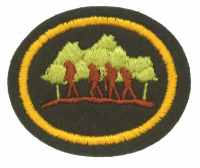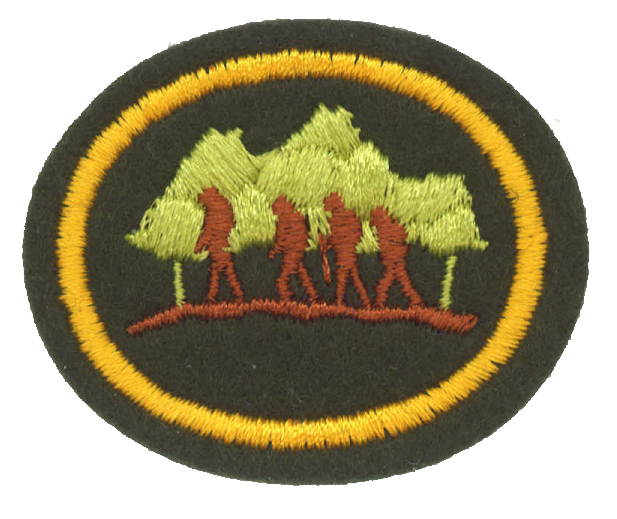AY Honor Outdoor Leadership Answer Key
1
See these pages for more information:
2
- a. Backpacking
- b. Camping Skills IV
- c. Fire Building & Camp Cookery
- d. Hiking
- e. Orienteering
- f. Pioneering
- g. Winter Camping
See these pages for more information:
3
For tips and instruction see First Aid, Standard.
4
Overcoming fear when lost
Many unprepared people are overcome by fear when they are in a situation they do not know how to handle. Studying the appropriate response to an emergency (like being lost in the woods) will help you overcome fear. If you can control your fear, you can concentrate on doing the right things to solve your problem rather than on your fear.
Try breathing deeply and deliberately. You can talk to your companions (if applicable) and calm each other down. You can also try prayer.
Here are a few things that you could do when lost:
Adventist Youth Honors Answer Book/Camping/Lost
Signaling for help
Call for help with a cell phone
These days, this is probably the most effective method of signaling for help. If you find yourself in trouble and need help, the cell phone is probably the first thing you will think of, and rightfully so. Voice communication is a very effective method of communicating with others. If you are in an area with a weak signal and voice communication is spotty, don't forget about text messaging. Texting can be successful even when voice communications fail because the phone will continue sending the message until it gets through.
Blow a whistle
You can blow a whistle much louder than you can yell. Furthermore, you can blow on a whistle repeatedly over a long period of time without getting a sore throat.
Adventist Youth Honors Answer Book/First aid/Signaling aircraft
5
Secular Activities
- Sit everyone in a circle. Go around the circle and have each person add one word to a story. Keep going around the circle until the story falls apart (it won't take long).
- Play board games.
- Collect and purify rainwater.
- Bring kazoos and do karaoke (everyone gets a kazoo except the singer).
- Work on the Weather honor.
- Play I Spy. Whoever is "it" chooses something, notes its color, and says "I spy with my little eye something red." (Assuming the noted color was red). Then have each person take turns guessing what it was.
- 20 Questions. It chooses an item and will answer up to 20 yes/no questions about what it is until someone guesses it.
- Charades
Sabbath Activities
- Play a game of Bible trivia.
- Read a story from the Bible and have others mime the parts as you read. Encourage them to be as expressive as they can.
- Sing a Christian hymn or song. You can even make one up if you want
- Have notepads and pencils available and draw sketches. You can sketch:
- Trees and rocks
- Other campers
- Bible stories
- Make a Bible rebus.
- Work on an honor from the Nature series.
- Build a fire in the rain (see Camping Skills IV). Talk about Elijah's experience on Mount Carmel.
- Read Genesis 6-8 (Noah).
- Put on your ponchos and go for a hike (unless there's lightning). Stay off ridges.
- Bible Charades.
6
6a
Ideally, the nature honor you teach should draw on the resources available in the chosen outdoor setting. For this reason, you may need to visit the site to see what kinds of flora and fauna are available for a nature study ahead of time. While some nature honors are not dependent on the presence of natural resources (such as the Weather honor), others (such as the Ferns honor or the Edible Wild Plants honor) will benefit greatly from their presence. Don't just hope for the best - prepare! Consult the Nature chapter of this book for more information.
6b
The first four AY Classes require that the Pathfinder earn Camping Skills I (Friend), Camping Skills II (Companion), Camping Skills III (Explorer), or Camping Skills IV (Ranger). The Voyager class must earn Fire Building & Camp Cookery plus Frontier Voyager classes can also optionally earn the Orienteering, Camp Craft, Winter Camping, or Backpacking honors. Frontier Guides must choose from Pioneering, Winter Camping, Backpacking, Wilderness Living and this honor (Outdoor Leadership).
6c
- Traditional methods
You can get an atlas or a map of the area, familiarize yourself with the nearby towns and cities. Then consult the business listings in a phone book looking under hospital until you find which one is closest to your site.
- Using Google Maps
One way to do this is by using the "Find businesses" feature of Google Maps. Enter "hospital" in the "What" box (which appears first), and the location or address of your outdoor setting in the "Where" box (which appears second).
- Using Mapquest
You can use the "get directions" feature at Mapquest.com. Under the "starting location", enter the address of the outdoor setting. Under the "Ending Location" enter "hospital" in the "place name" box, and the same city or town as the starting location - even if there is no hospital in that town, it will return the nearest hospital to you. It will display a list of hospitals and veterinary clinics, ordered by distance (nearest first). Check that the facility you choose is indeed a hospital for humans.
6d
If your outdoor setting is under the jurisdiction of a park ranger organization, they would be your primary source of help if there is an emergency. Otherwise, you should use the same techniques outlined for finding a hospital to find the nearest police station.
7
7a
7b
7c
7d
7e
8
8a
Knife Safety
Adventist Youth Honors Answer Book/Camping/Knife safety
Axe Safety
Adventist Youth Honors Answer Book/Camping/Axe safety
Poisonous Plants
Adventist Youth Honors Answer Book/First aid/Poison ivy
8b
8c
8d
8e
- Treat everyone with respect.
- Do not go off alone.
- Let your counselor know where you are going, who you will be with, and when you will be back. Never leave without permission.
- Always go in threes.
- Do not light fire unless an adult is present.
- Practice fire safety.
- Practice axe, hatchet, and knife safety.
- Wear a PFD (Personal Flotation Device) when using a boat of any type.
- Always leave an area cleaner than you found it.
- Remember that medical assistance is more difficult to get and takes longer to arrive in wilderness areas (what's the address of some point on a trail?) Because of this, ratchet up the caution level. Don't take chances.
- Keep down the noise level so you do not disturb others.
- Make sure you are welcome to return.
- Do not take, destroy, or damage facilities, plants, or animals.
- Report accidents as soon as possible.
- Do not trespass.
8f
As an outdoor leader, you need to remember that the people you are leading will have different ways of observing the Sabbath. Most Adventist children of Pathfinder age will observe it as they have been taught by their parents, and it is important that you not undermine the parents' teaching in this regard. "Liberal" parents will not mind if you lead their children in conservative Sabbath observance, but "conservative" parents are likely to get very upset if engage in activities they are forbidden to do at home. Because of this, you are encouraged to adopt a conservative approach to Sabbath observance when you are leading them. You should do this even if none of the children in your care come from conservative homes, because if a new one joins you who is conservative, you will put that child at a serious disadvantage when you suddenly have to change the "rules". The Sabbath will then become a burden both to the new child and to the others who have been in the club for a while.
Likewise, you should be careful about telling children from liberal families that their observance of the Sabbath is inadequate or flawed. Rather, you should tell them "the club does not observe the Sabbath that way" without making a judgment on the way the child has been taught at home.
Properly observed, the Sabbath is not to be a burden.
"Remember the Sabbath day, to keep it holy." Here, "holy" means "set aside for a special purpose." The Sabbath is set aside as a day for us to learn more about God and to ponder His Creation. Just as a park is a place set aside for special activities, the Sabbath is "a park in time." We do not build homes, offices, or factories in parks, nor do we engage in everyday tasks on the Sabbath. We put aside our homework, housework, and our livelihood-work and take a break from it. This is a gift from God.
The Sabbath is a memorial to the creative power of God, so that really makes it a perfect day to acquaint ourselves and others with God's Creation.
9
- Take the "take only pictures, leave only footprints" motto to heart.
- Pick up litter
- Prefer low-impact recreational activities:
- Use canoes and kayaks instead of motor boats
- Use cross-country skis or snowshoes instead of snowmobiles
- Use hiking boots instead of ATVs
- Practice fire safety
- Stay on the trail
- Participate in wilderness and park beautification projects
- Reduce, reuse, and recycle - this lowers the stress on natural resources.
10
- Pages using DynamicPageList3 parser function
- AY Honors/Prerequisite/Camp Craft
- AY Honors/See Also/Camp Craft
- AY Honors/Prerequisite/Camping Skills I
- AY Honors/See Also/Camping Skills I
- AY Honors/Prerequisite/Camping Skills II
- AY Honors/See Also/Camping Skills II
- AY Honors/Prerequisite/Camping Skills III
- AY Honors/See Also/Camping Skills III
- AY Honors/Prerequisite/Backpacking
- AY Honors/See Also/Backpacking
- AY Honors/Prerequisite/Camping Skills IV
- AY Honors/See Also/Camping Skills IV
- AY Honors/Prerequisite/Fire Building & Camp Cookery
- AY Honors/See Also/Fire Building & Camp Cookery
- AY Honors/Prerequisite/Hiking
- AY Honors/See Also/Hiking
- AY Honors/Prerequisite/Orienteering
- AY Honors/See Also/Orienteering
- AY Honors/Prerequisite/Pioneering
- AY Honors/See Also/Pioneering
- AY Honors/Prerequisite/Winter Camping
- AY Honors/See Also/Winter Camping
- AY Honors/Prerequisite/First Aid, Standard
- AY Honors/See Also/First Aid, Standard
- Adventist Youth Honors Answer Book
- Missing Localization/All/Outdoor Leadership AY Honor.png/en
- Missing Localization/All/Wilderness/en


